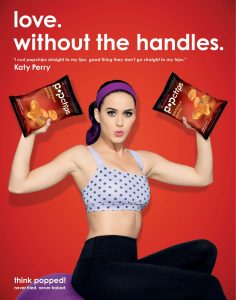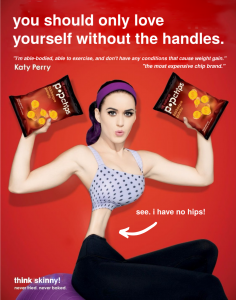Rejecting Beauty Standards: The Subversion of Katy Perry’s 2012 Popchips Ad Campaign

Original Ad (Nudd, 2012)
The Problematics of The Original Ad
There are a plethora of dangerous messages contained within Katy Perry’s 2012 ad campaign for popchips. Firstly, the ad promotes the view that self-love comes from feeling content in one’s body. That said, the ad goes on to further suggest that such contentment in one’s body comes from achieving stereotypical feminine standards of beauty—a standard that is disapproving of “handles” or “hips” (Nudd, 2012).
At the same time, the ad features a quote by Katy Perry in which she describes curling popchips to her lips. As such, she asserts that it is a “good thing they don’t go straight to [her] hips” (Nudd, 2012). This quote is problematic for several reasons. Firstly, it portrays able-bodiedness as the norm by way of Perry’s representation in the ad. Through such, the ad is directed at audiences who are health-conscious and able to exercise by traditional means. Secondly, the quote assumes that audiences do not have conditions that cause weight gain. Thirdly, the quote perpetuates the idea that it is both bad and undesirable to have food go to the “handles” or “hips” (Nudd, 2012). Finally, the quote—along with the overall ad as a whole—serves to equate health with thinness.
Likewise, popchips, which is recognized as the “the most expensive chip brand,” uses an A-list superstar to advertise its brand (Freedman & Jurafsky, 2018, “Distinction,” para. 7). By doing so, popchips advertises the idea of exclusivity in which Katy Perry uses her status to promote a costly brand to a select set of consumers who both desire to join an exclusive group and have the economic means to do so.
Another problematic aspect of popchips’ ad is that it further promotes unrealistic and unhealthy beauty standards centred around whiteness and thinness by placing Perry in attire that clearly depicts her pale skin and athletic physique. As such, in the ad campaign for popchips, Katy Perry’s light skin appears to be accentuated—either by way of lighting or through editing. Ultimately, the philosophy illustrated through “think popped” is one centred around exclusivity and the idea of health being achieved exclusively through thinness.
Jammed Ad
Jamming Methodology
In the jammed version of the 2012 Katy Perry popchips ad campaign, I have attempted to deconstruct and subvert many of the troubling messages present in the original ad. As such, most significantly, I changed the title text of the original ad which broadcast that, first and foremost, by purchasing and eating popchips, one could “love [themselves] without the handles” (Nudd, 2012). To highlight the troublesome and unhealthy beauty standards promoted by the ad, I subverted the original title with “you should only love yourself without the handles.” By doing such, the jammed version of the 2012 advert highlights the implicit message of the original ad—that is, that one cannot, and should not, love oneself if they do not meet the beauty standards portrayed by Katy Perry in the ad campaign.
On that note, I have highlighted the absurdity of the ad’s assumptions regarding beauty and self-love by exponentially shrinking Katy Perry’s waist in the ad as a means of reinforcing the ridiculousness of the ad’s message. In the original ad, the quote by Katy Perry states that she “curls popchips straight to [her] lips” and that it is a “good thing they don’t go straight to [her] hips.” Firstly, taken alongside the other messaging, this quote perpetuates the idea that an individual’s worth derives from their ability to maintain a petite physique. On another level, this quote represents an able-bodied account by a woman who is able to exercise, and presumably has no conditions that cause weight gain. Because of such, I changed the original quote to reflect this reality.
In the jammed version of the ad, I also edited Perry’s white skin—which already appeared to be artificially lightened—to be whiter. In doing so, I hoped to subvert the role of colourism in the construction of beauty standards (Phoenix, 2014). Finally, I replaced the chips with dollar signs to highlight that popchips are “the most expensive chip brand” (Freedman & Jurafsky, 2018, “Distinction,” para. 7). I did this to draw attention to the exclusiveness of popchips, both as something advertised by a superstar and as something that is promoted as a tasteful snack to enjoy in accordance with achieving stereotypical feminine standards of beauty. To reflect the true philosophy of the original ad, the presence of the slogan “think popped!” was replaced with “think skinny!”—which serves as popchips ultimate message in the ad.
